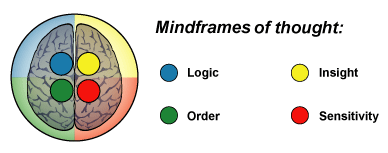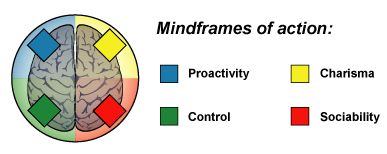I think that INTJs can be just as openminded(maybe even more) as INTPs, just in a different way.
I wouldn't call almost 100% reliance on empirical data
open-minded, even in a
different way. INTJ's are open to possibilities, so long as they are founded, in this hardcore sequential manner, i.e — they test ideas according to what they know in a very rigorous fashion. If the ideas don't pass this sequential breakdown, they are more likely to consider it rubbish, if anything. I've seen it happen all the time.
True open-mindedness is to consider ideas which might not seem applicable at first, and try them anyway, only to discard them once they have shown to be truly useless. To my mind, this seems true of ENTP's and INTP's. We are open to all kinds of left-field possibilities which other people might consider impossible, or implausible. INTJ's seem more limited to truly
practical possibilities. In fact, many sites often state that one of the pitfalls of being INTJ is that they usually dismiss ideas before actually understanding them thoroughly, i.e. — before giving them a chance. "Actually try to understand an idea before dismissing it" is one of the ways in which INTJ's can actually grow and mature.
They have more freedom with Ni, they have less reliance on definitional terms, an idea that might seem like a complete contradiction to an INTP(surely we won't be too happy about that), to an INTJ, they can come at it from a totally different interpretation, a new angle on the idea while the INTP can't get past the idea not being definitionally consistent. Ti is all about precision too, even more than Te.
I'm not so sure Ni is more free than Ne (which is where our ideas as INT thinkers inherently arise). And I'm fairly sure that Te is entirely more restrictive and limiting than Ti. Definitional terms (Ti) do not restrict ideas (Ne), in terms of possibilities — they only keep them coherent. Thus, an idea which may be entirely impractical, but which is nonetheless coherent, will seem worth discussing to an INTP. An INTJ, on the other hand, driven by a larger need to sequentially verify ideas (Ni) according to what is empirically known (Te) will only accept what is practical. Thus, an idea which may be slightly incoherent, but which is actually practical, will appeal to an INTJ.
Thus, I see practical/impractical to be more limiting than whether or not an idea is actually entirely coherent, from a purely logical standpoint. And again, Ti never usually stifles an INTP's thoughts. Ideas are bouncing around and Ti is trying to control them, but those ideas will be considered and played with as long as they are coherent, even if they don't actually apply to the real world. Hence, INTP's enjoy thinking in and of itself, and enjoy thoughts even if they may not be practical or applicable. INTP's appreciate
beautiful constructs of thought, even if they aren't worth anything in a practical sense. INTJ's only enjoy thinking with a purpose that has clearly defined ends, i.e. — something that will actually be worth the effort and pay off in the end. INTJ's don't like armchair philosophizing as much as INTP's. To me, this is more narrow-minded.
From the outside an INTP(Ne) will look alot more openminded than an INTJ(Te), INTPs can be extremely speculative while INTJs might play it more safe because they need to be sure of the subject being discussed(this might make INTJs look more competent too, INTPs blathering off at the mouth can look foolish), but if an idea can be shown to work to the INTJ, they will be willing consider ANY idea. Te can just appear so ruthless sometimes, but Ni seems very big picture oriented, it will look at an idea from different interpretations.
Considering only ideas that are shown to work is not open-minded — it's narrow and limited to what is practical and applicable to the real world. Boundless amounts of possibilities are bubbling around in the world beyond what we may 'think' is workable or practical. ENTP's and INTP's show this often. We're more open to what may be beyond current comprehension. Hence, INTJ's are limited to what 'seems' practical in the current, according to what we know scientifically. NTP's may look beyond our current understanding when seeking possibilities, and this difference is crucial. Thus, INTJ's might be open-minded, to an extent, but nowhere nearly as open as ENTP's and INTP's. They seem to have a natural epistemological barrier upon which they tend to rely. They don't enjoy going beyond empirical boundaries. So no, INTJ's aren't open-minded in the way INTP's are, and I wouldn't really call their sense of possibilities "open," per se. You're really reaching here.
And the notion that Te appears ruthless at times is the tip of the iceberg — it's often entirely tyrannical and brutish.


 )
)
